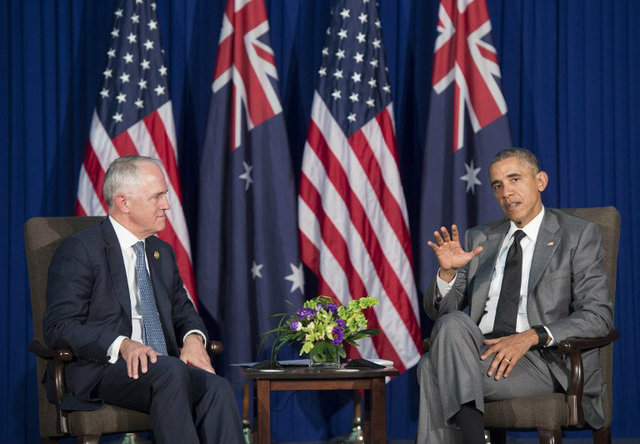Meeting in Manila, leaders of the two major allies of the Philippines stress the importance of maintaining freedom of navigation in the South China Sea

'PEACEFUL SETTLEMENT.' Australian Prime Minister Malcolm Turbull and US President Barack Obama push for peaceful settlement of the South China Sea dispute. They meet in Manila on the sidelines of the Asia-Pacific Economic Cooperation (APEC) Summit. Photo by Saul Loeb/AFP
US President Barack Obama and new Australian Prime Minister Malcolm Turnbull reaffirmed their countries' commitment to the rule of law in the heated dispute over the South China Sea (West Philippine Sea)
In a bilateral meeting here on Tuesday, November 17, the leaders of two major allies of the Philippines discussed the maritime row, just weeks after Washington angered China by sending a destroyer near one of the artificial islands it is building in the South China Sea.
Obama said the US and Australia talked about “the importance of maintaining freedom of navigation and maritime rules.”
“Since neither of us are claimants in some of the controversies that are taking place in the South China Sea, it's, I think, very important for us simply to uphold the basic principle that these issues should be resolved by international norms and rule of law, and peacefully settled. And we're hopeful that that can be accomplished,” Obama said in remarks after the meeting at the Sofitel Hotel in Pasay.
Obama and Turnbull are in Manila to attend the Asia-Pacific Economic Cooperation (APEC) summit, where the dispute among China, the Philippines and other Southeast Asian nations is not on the official agenda. Yet the US said it will be a “central issue” in its bilateral talks.
Turnbull, who came into office only in September, said he and Obama “are very much of the same mind.”
“We are committed to the rule of law, to ensuring that the big changes in this region occur in a peaceful manner and in accordance with international norms. That’s absolutely vital for the continued peace and security of our region,” he said.
Both the Philippines and China invoke the rule of law in defending their claims and actions in the South China Sea. Yet Beijing drew criticism from the US over its massive reclamation that turned reefs and shoals into islands with runways and military outposts.
Manila also cites the rule of law in its historic arbitration case against Beijing, which will proceed in hearings set next week.
Vietnam, Malaysia, Brunei, and Taiwan also have claims to the strategic area believed to have vast reserves of oil and gas, and vital fishing sites.
'TPP establishing high standards'
Obama and Turnbull also discussed the US-led free trade deal, the Trans-Pacific Partnership (TPP), finalized in October.
The US and Australia are among 12 parties to the TPP, which aims to create the region's largest free trade agreement accounting for about 40% of the global economy. The deal is the “economic cornerstone” of the US policy of rebalancing economic and military attention to Asia.
Obama said the US and Australia are “strong trading partners.”
“We very much appreciate the constructive work that was done between our trade ministers in completing TPP, which is going to establish the kinds of high-standard rules of the road in trade and commerce,” said the US President.
Turnbull said the deal is a key part of Australia's strategy to ensure that it remains a “high-way, generous social welfare net, and a first-world economy.”
“The flexibility that open markets and trade enables us better to deal with the disruptive change that we encounter in a modern global economy that is expanding but changing at a pace that has never seen before in the history of human development. Open markets, flexible markets, agility – these are all part of the tools that enable us to continue to progress.”
Obama, Turnbull, and leaders of the 10 other TPP parties are meeting in Manila to discuss how to move the deal forward, and get it ratified in their respective legislatures.
Also part of the TPP are APEC members Brunei, Canada, Chile, Japan, Malaysia, Mexico, New Zealand, Peru, Singapore, and Vietnam.
'Ramping up pressure vs ISIS'
The two leaders also exchanged views on the campaign against terror group Islamic State of Iraq and Syria (ISIS) days after the Paris attacks that killed 129.
Obama pointed out that Australia is the second largest contributor to the anti-ISIS coalition. He said he and Turnbull discussed the need to “ramp up” pressure against ISIS to prevent atrocities like the Paris attacks.
“We've also had a chance to talk about how we can reach out to our own people and Muslim communities in order to ensure that they feel fully a part of American and Australian democracy,” he said.
Turnbull said Canberra will continue its support for the coalition.
“We will continue, shoulder-to-shoulder, with the United States and our allies in the fight against this type of extremist violence, this type of terrorism.”
The Australian leader also acknowledged efforts of Muslim majority nations in the region to condemn the Paris attacks. He cited Indonesian President Joko Widodo, Turkish President Recep Tayyip Erdogan, and Malaysian Prime Minister Najib Razak.
The 3 leaders were with Obama and Turnbull in Turkey for the G20 summit preceding APEC.
Najib will join Obama and Turnbull in the APEC Economic Leaders' Meeting to start on Wednesday.

No comments:
Post a Comment
Note: Only a member of this blog may post a comment.